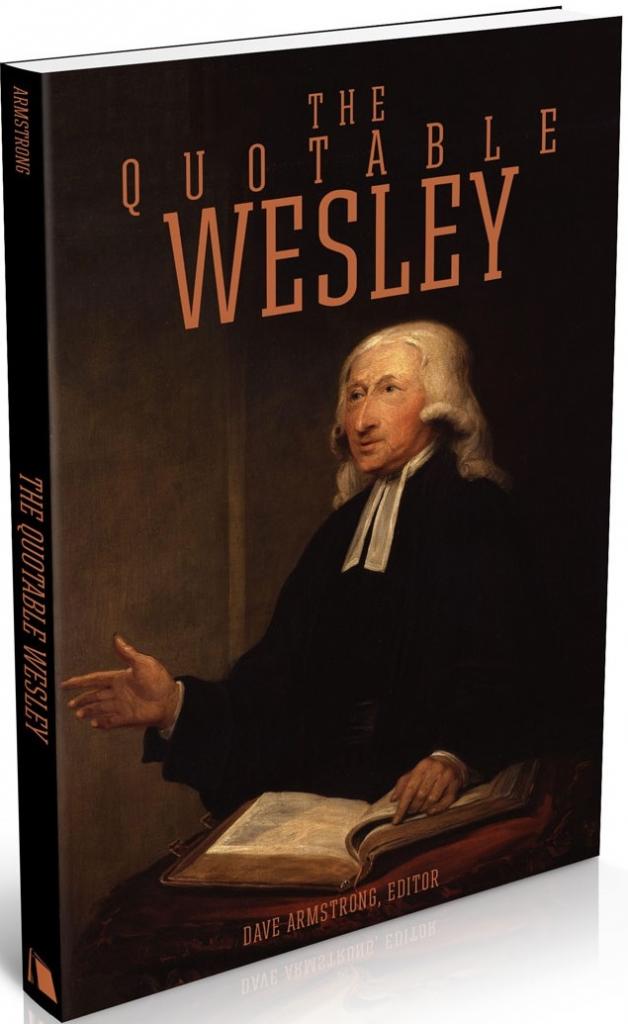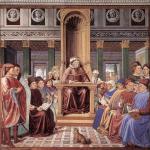
John Wesley’s words will be in blue. I was initially responding to remarks from someone who had stated that faith alone (sola fide) was essential to any definition of a Christian.
*****
If sola fide [“faith alone”] defines a Christian, then John Wesley and Methodists, the whole Wesleyan tradition, and many traditional Anglicans are not Christians. Such a conception of Christianity would exclude folks like John Wesley himself, C. S. Lewis, and Dorothy Sayers.
With regard to the condition of salvation, it may be remembered that I allow, not only faith, but likewise holiness or universal obedience, to be the ordinary condition of final salvation . . . At what time soever faith is given, holiness commences in the soul. For that instant `the love of God’ (which is the source of holiness) `is shed abroad in the heart’. (A Farther Appeal, 1745, Works, London: 1831, VIII, 68 ff.)
Suffer me to warn you of another silly, unmeaning word: Do not say, ‘I can do nothing’. If so, you know nothing of Christ; then you have no faith: For if you have, if you believe, then you `can do all things through Christ who strengtheneth you’. You can love him and keep his Commandments. (A Blow at the Root, 1762, Works, X, 369)
1. God works in us – therefore man can work. Prevenient grace is accorded to all. 2. God works in you – therefore you must work. You must work together with Him, or He will cease Working. (Working Out Our Own Salvation, 1788, Works, VI, 511 ff.)
Wesley himself claimed to teach nothing but justification by faith. But he was not satisfied, like the pietists before him. with bringing sanctification and justification into the closest possible relation, after the Calvinist formula he was fond of recalling. More penetrating than any of his predecessors, he criticised Luther’s opposition of faith to works as a sophistry. As early as the year 1739, when he started on his new course of action, he denounced what he called Luther’s ‘mania of solifideism’. Luther’s commentary on the epistle to the Galatians, with its unbalanced depreciation of the divine Law, was in his view more likely to be pernicious than beneficial in its results. His reason was that the holiness of Christ should by no means be opposed to the holiness accessible to the Christian, but, rather, be represented as its unique source.
Far from admitting, therefore, that the epistle of St. James deserved to be called an ‘epistle of straw’ [Luther’s phrase], he called it ‘the great antidote Against the poison’ of a justification which required no moral change in the Christian . . .’
Wesley . . . taught more and more clearly that since the great effect of conversion was the regeneration by grace of the human will, the human will ought to work for its own salvation, and make daily progress, otherwise, even if the conversion was real in the beginning, it would become ineffective, through want of perseverance. (Louis Bouyer, The Spirit and Forms of Protestantism, translated by A. V. Littledale, London: Harvill Press, 1956, 221-222)
Note that the opinions date from throughout his long ministry, so it doesn’t look like much changed in any fundamental sense, though I’m sure Wesley’s thought developed.
The first three citations above were retrieved from the book: Wesley and Sanctification, by Harald Lindstrom (Lutheran), Grand Rapids, Michigan: Francis Asbury Press (division of Zondervan), 1980.
There is much more data in that book, if someone wants to challenge me on this. In any event, I highly doubt that Calvinist-type anti-Catholics will now start writing polemical tracts against Methodists and Wesleyans, even though their interior logic forces them to concede that they aren’t Christians (if they understand the information I provided above). That “theological righteous indignation” is reserved only for the Catholic Church.
More on Wesley’s denial of “faith alone”:
4. Nor, lastly, is he distinguished by laying the whole stress of religion on any single part of it. If you say, “Yes, he is; for he thinks ‘we are saved by faith alone:'” I answer, You do not understand the terms. By salvation he means holiness of heart and life. And this he affirms to spring from true faith alone. Can even a nominal Christian deny it? Is this placing a part of religion for the whole? “Do we then make void the law through faith? God forbid! Yea, we establish the law.” We do not place the whole of religion (as too many do, God knoweth) either in doing no harm, or in doing good, or in using the ordinances of God. No, not in all of them together; wherein we know by experience a man may labour many years, and at the end have no religion at all, no more than he had at the beginning. Much less in any one of these; or, it may be, in a scrap of one of them: Like her who fancies herself a virtuous woman, only because she is not a prostitute; or him who dreams he is an honest man, merely because he does not rob or steal. May the Lord God of my fathers preserve me from such a poor, starved religion as this! Were this the mark of a Methodist, I would sooner choose to be a sincere Jew, Turk, or Pagan.
5. “What then is the mark? Who is a Methodist, according to your own account?” I answer: A Methodist is one who has “the love of God shed abroad in his heart by the Holy Ghost given unto him;” one who “loves the Lord his God with all his heart, and with all his soul, and with all his mind, and with all his strength. God is the joy of his heart, and the desire of his soul; which is constantly crying out, “Whom have I in heaven but thee? and there is none upon earth that I desire beside thee! My God and my all! Thou art the strength of my heart, and my portion for ever!” (The Character of a Methodist, date not given; emphasis added; from the Thomas Jackson edition of The Works of John Wesley, 1872)
Now, one will note that Wesley often states that he accepted “justification by faith alone,” but he defines it differently than Luther, Calvin, Lutherans, Reformed, and Baptists do. Far as I can tell, he views it much as a Catholic would: faith and works, justification and sanctification, conversion and holiness are in close organic harmony with each other, rather than formally separated, with works playing no part whatsoever in salvation.
Many of Wesley’s statements rule out the latter interpretation. His views of both justification and sanctification differ from the standard Reformed / Baptist / Lutheran understanding of these notions and categories.
Here is a fascinating overview of John Wesley, if anyone’s interested: “John Wesley at 300: the man, his times and his faith,” by Victor Shepherd. Example:
Of all the misunderstandings that falsify Wesley and his spiritual descendants, none is more defamatory than the assumption that the Methodist tradition doesn’t think. While it is readily acknowledged that the Lutheran, Reformed, Roman Catholic and Eastern Orthodox families within the church catholic think and have always thought, Methodism, it is sometimes said, merely emotes.
Wesley contradicts this. Having insisted that his lay preachers study five hours per day, he studied more himself. He authored grammar textbooks in seven of the eight foreign languages he knew.
He deplored as narrow, ignorant and foolish the suggestion that preachers need read only one book. Such fanaticism meant that reading only the Bible guaranteed misreading it. Those who complained of having “no taste for reading” he rebuked on the spot: “Contract a taste for it by use, or return to your trade” — and watched more than a few preachers move back to farm, shop or mine.
His reading was as broad as it was deep. No area of intellectual endeavour escaped him. All his life he kept abreast of contemporary explorations in natural science. Schooled in classical philosophy at Oxford, he probed the contemporary empiricist thinking of John Locke. Aware that history is a theatre both of God’s activity and of the church’s response, he wrote a world history.
While his fellow Protestant Calvinists go after Wesley, I will continue having immense respect for him (as an editor of a book of his quotations, who particularly respects his model of 100%-dedicated evangelism). If the Calvinists have more in common with his theology than I do, they (the ones who trash him) sure aren’t acting like it, are they?
It seems to me that Wesley in relation to the zeitgeist and established religion in England is a lot like Kierkegaard’s relation to Danish Lutheranism. It’s a reform and (in the very best sense) “radical” spirit, which is why I admire these two men so much. Heaven knows we Catholics need men like that too. I think that Pope St. John Paul II was one of them.
***
(originally 10-20-05)
Photo credit: see purchase information for this book that I edited. Cover design by Robbie Knight. Published by Beacon Hill Press (Protestant) in 2014.
***













